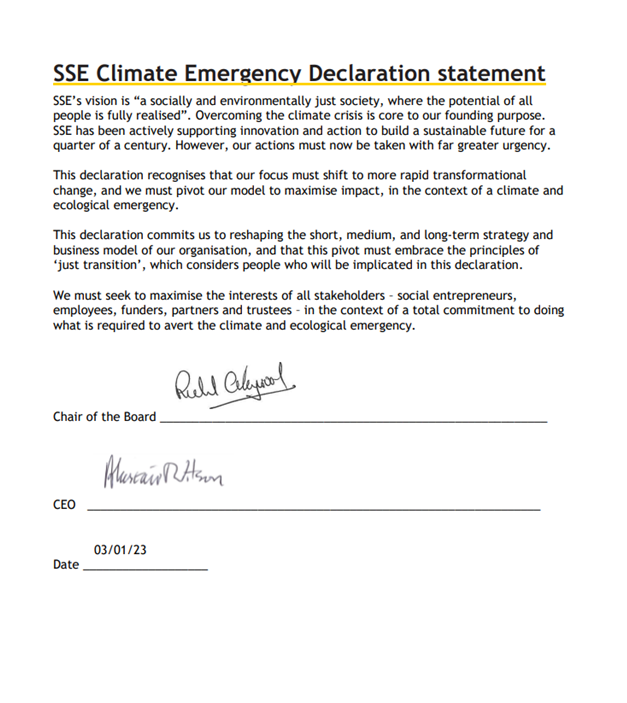SSE’s Action Plan for the Climate and Ecological Emergency
16 Jan 2023
We started 2023 by putting our best foot forward, signing a landmark declaration and action plan to step up our work towards environmental regeneration.

SSE’s Declaration signed by Chair of the Board, Richard Collier-Keywood and CEO Ali Wilson.
While we’re not the first organisation to make this public statement, overcoming the climate crisis and destruction of nature is core to SSE’s founding purpose. It’s a pillar of our strategy and key to our vision for “a socially and environmentally just society, where the potential of all people is fully realised”.
So, after actively supporting innovation and action to build a sustainable future for 25 years, what’s new? The statement recognises that to achieve these goals our focus must now shift to more urgent and transformational change.
Walking the talk
To deliver on our promises, we may need to boost our model to maximise inclusive, regenerative growth and leverage opportunities that might ‘shift the needle’ on this global emergency. For example, could SSE replicate, merge or more intensively hothouse projects with significant potential to achieve a just transition?
Bolder action faster
The value of declaring is in the resources it unlocks to make change, the accountability it creates and the speed at which we can adapt.
It unleashes the changemaking talents of our whole fantastic team. A whole team meeting in recent days brought our collective ingenuity it bear on how we achieve these challenging targets.
Given that SSE’s work has enabled an abundance of sustainable business leaders in the UK, Canada and India – among them Earthshot Prize winner, Vidyut Mohan – the bar for improving our impact is set high.
We will be reporting on progress every March from 2024 so watch this space…
Action plan summary
We will work towards these goals, ensuring plans are in line with reaching net zero between 2025-2050 and keeping the global increase in temperature within 1.5C. These are the actions proposed by our Climate Action Working Group to be explored and expanded by all departments.
-
Students and Fellows
Our greatest opportunity for impact sits with our learning programmes and collaboration with students and fellows.
Students
- Deliver a decarbonisation component into long-duration programmes, including content on the circular economy.
- Build on existing partnerships and be intentional in developing broader partnerships and funding opportunities to secure environmental opportunities.
- Create climate-focussed programmes and embedCircular Economy principles into development and delivery.
Fellows
- Continue our work from recent Fellows events and our current Fellows Future Fund round to ensure environmental impact remains a key pillar of our work.
- Actively engage with Fellows with strong environmental credentials.
- Provide free access for fellows to decarbonisation and circular economy learning materials.
- Create environmental forums on the Fellows Portal – a creative space for social entrepreneurs to share ideas and collaborate.
- Showcase fellows who are outstanding environmental leaders.
- Regularly invite fellows who have made significant environmental achievements to attend meetings and share their perspectives.
-
Direct Impacts
Our business model means SSE’s direct environmental impact is likely to be relatively small, but it is still important to understand and reduce this where possible.
- We will develop a baseline impact report to enable us to measure progress including:
- staff travel.
- recycling in offices.
- energy use.
- procurement.
- Incorporate questions that track our internal impact through our annual staff survey.
- Work with operations to track greenhouse gas emissions, such as logging travel expenses, to enable reductions.
Understanding our wider impact:
- Work with the Impact Lead to add questions into student applications and surveys, to track longitudinal environmental data.
- Research methods to measure our environmental impact and have mechanisms in place by the end of the year to be able to track our reduction towards Net Zero as effectively as possible.
-
Investments
- Consider the climate and ecological credentials of our suppliers, such as utilities, banks, and pension providers and, where appropriate, change suppliers in favour of those with more sustainable climate and ecological practices.
-
Buildings
- Understand the current environmental impact of our offices, equipment, and processes, so that we can focus on those areas where we can make the most significant improvements.
- Work closely with the strategic projects team to ensure Climate Action values and processes are embedded in the selection criteria for future SSE offices.
We will endeavour to achieve the above projects by April 2024, at which point we will take an internal review and create an updated impact report.
Looking to the future
In the longer term, the Climate Action Working Group will explore the following opportunities:
- Renewable energy installation for workplaces.
- Increased investment available for projects that address the climate crisis, creating opportunities to explore investment for more sector-specific SSE programmes.
- Establishing carbon offset accreditation for SSE and/or fellows to secure ongoing investment.
- Developing discrete pilot projects to be rolled out nationally.
- Developing short courses and webinars to sell into our sales client base.
- Explore innovations in scaling based on analysis of fellows’ current activity, such as:
- brokering partnerships and collaborations.
- targeted support to adapt fellows’ successful models for new territories.
- Focus on SSE branding and messaging shifting from an emphasis on social to both social and environmental impact.
- Further exploration of sustainability frameworks eg Circular Economy, Doughnut Economics.
This action plan was developed by the Climate Action Working Group, led by Sally Heard – Director of Development & External Affairs. With thanks to the Ellen McArthur Foundation based at the University of Exeter Business School for engaging with us on the Circular Economy and its relationship with equity and social justice.
